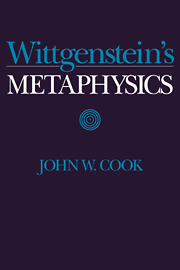Book contents
- Frontmatter
- Contents
- Preface
- List of Abbreviations
- Introduction
- Part I From Idealism to Pure Realism
- Part II The Metaphysics of Wittgenstein's Later Philosophy
- Part III Causation and Science in a Phenomenal World
- 11 Hume on Causation
- 12 Wittgenstein's Humean View of Causation
- 13 The Problem of Induction
- Part IV Logical Possibilities and the Possibility of Knowledge
- Part V The Past, Memory, and The Private Language Argument
- Name Index
- Subject Index
11 - Hume on Causation
Published online by Cambridge University Press: 05 November 2011
- Frontmatter
- Contents
- Preface
- List of Abbreviations
- Introduction
- Part I From Idealism to Pure Realism
- Part II The Metaphysics of Wittgenstein's Later Philosophy
- Part III Causation and Science in a Phenomenal World
- 11 Hume on Causation
- 12 Wittgenstein's Humean View of Causation
- 13 The Problem of Induction
- Part IV Logical Possibilities and the Possibility of Knowledge
- Part V The Past, Memory, and The Private Language Argument
- Name Index
- Subject Index
Summary
In this chapter and the two that follow we must go to the heart of empiricism: the Humean view of causation. This is not simply one topic among others, for the empiricist view of causation brings in its wake some fantastical ideas about language and the proper conduct of philosophy. In particular, it burdens us with the idea of “logical possibility,” which leads, as we will see in Chapter 14, to a peculiar view of the way in which philosophy is to construct and deal with examples. To understand this matter fully, we must investigate its source – or its modern source – in Hume.
What Was Hume Talking About?
What lesson, exactly, are we supposed to learn from Hume's discussion of causality? G. E. M. Anscombe states the lesson as follows:
… [Hume] made us see that given any particular cause – or ‘total causal situation’ for that matter – and its effect, there is not in general any contradiction in supposing the one to occur and the other not to occur. That is to say, we would know what was being described – what it would be like for it to be true – if it were reported for example that a kettle of water was put, and kept, directly on a hot fire, but the water did not heat up.
Hume, I am sure, would have found this a tidy summary of his views on causation, but there is something peculiar about it nonetheless.
- Type
- Chapter
- Information
- Wittgenstein's Metaphysics , pp. 155 - 173Publisher: Cambridge University PressPrint publication year: 1994



